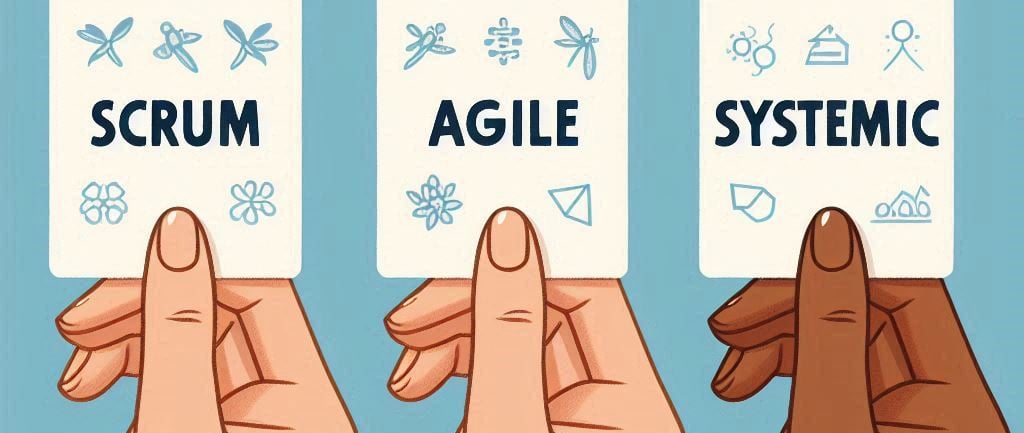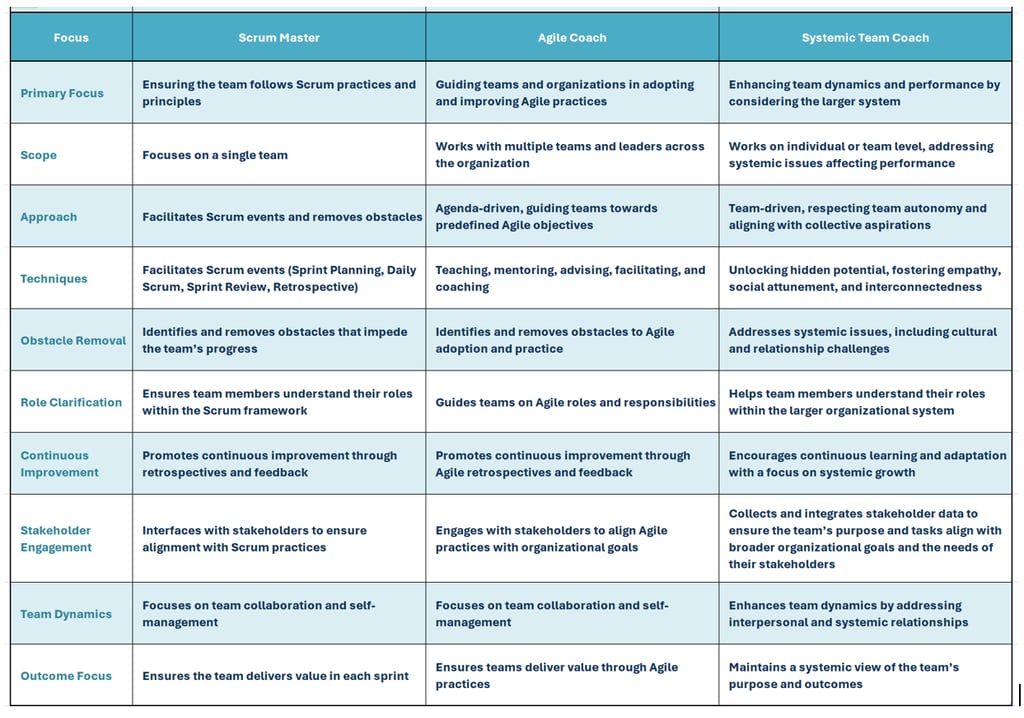The Complementary Roles of Scrum Masters, Agile Coaches, and Systemic Team Coaches in Agile Teams
As a systemic team coach, I was navigating the complexities of coaching agile teams in matrix organizations that operate worldwide, and it felt like trying to untangle a jungle of vines. I found myself puzzled by the myriad of challenges these teams face. From cultural diversity and time zone differences to varying levels of agile maturity and stakeholder expectations, the complexities are as diverse as the teams themselves.


The Complementary Roles of Scrum Masters, Agile Coaches, and Systemic Team Coaches in Agile Teams
In the dynamic world of agile teams within matrix organizations, Scrum Masters, Agile Coaches, and Systemic Team Coaches each play crucial roles. While their responsibilities overlap in some areas, their approaches and focuses differ significantly. I decided to explore these differences and highlight how a collaboration between these roles can lead to better results on multiple fronts.
Overview of Roles and Responsibilities
Complementary Approaches
> Outside-In Perspective: While Scrum Masters focus on internal team processes, Agile Coaches and Systemic Team Coaches bring an outside-in perspective by considering external factors and stakeholder relationships that impact the team.
> Future-Back Approach: Systemic Team Coaches help teams envision their future state and work backward to identify necessary steps, complementing the Scrum Master’s focus on iterative progress and the Agile Coach’s broader organizational goals.
> Stakeholder-Informed Approach: Systemic Team Coaches collect and integrate stakeholder data to ensure the team’s purpose and tasks align with broader organizational goals and the needs of their stakeholders. This complements the Scrum Master’s role in maintaining alignment with Scrum practices and the Agile Coach’s role in aligning Agile practices with organizational goals.
> Holistic View of Team Dynamics: Systemic Team Coaches address both individual and team dynamics, fostering empathy, social attunement, and a clear understanding of the interconnectedness within the team and the larger organizational system. This enhances the Scrum Master’s and Agile Coach’s efforts to promote collaboration and self-management.
> Preventing Process Overload: While Scrum Masters guide teams through Scrum processes and Agile Coaches drive Agile transformation, Systemic Team Coaches ensure the team does not lose sight of the overall purpose and outcomes. This prevents teams from drowning in processes and helps maintain a systemic view of stakeholders and goals.
Addressing Cultural Diversity
In a matrix organization, Squad members often come from different continents, countries, and cultures. This cultural diversity can lead to misunderstandings and conflicts if not managed properly. While Scrum Masters and Agile Coaches focus on facilitating Agile practices and promoting an inclusive environment, Systemic Team Coaches play a crucial role in addressing cultural and relationship challenges. They facilitate discussions on cultural differences and help team members understand and appreciate diverse perspectives. This holistic approach ensures that cultural diversity becomes a strength rather than a hindrance, fostering a more inclusive and collaborative team environment.
Building Team Identity Through Learning
Systemic Team Coaches play a vital role in helping teams build their identity through learning. They guide teams in understanding how their commission and roles contribute to forming their identity. By learning together, teams can build a collective identity from individual values and styles. Systemic Team Coaches help teams build identity through learning relationships across the business, co-creating and testing their identity with key stakeholders. This process involves individual and team learning to create a lived identity within the business. This focus on identity formation is unique to Systemic Team Coaches and is not typically within the scope of Agile Coaches.
Conclusion
Collaboration between Scrum Masters, Agile Coaches, and Systemic Team Coaches can lead to more effective and resilient agile teams. While Scrum Masters ensure adherence to Scrum practices and facilitate continuous improvement, Agile Coaches bring a broader perspective that enhances team dynamics, stakeholder engagement, and outcome focus. Systemic Team Coaches further complement these roles by addressing systemic issues and fostering a holistic understanding of the team’s role within the larger system. This complementary approach not only addresses immediate challenges but also sets the foundation for long-term success in a global, agile environment.
By integrating the strengths of all three roles, organizations can create high-performing, high-value creating teams that are well-equipped to navigate the complexities of a matrix organization. The benefits of such collaboration include improved team cohesion, enhanced communication, and a stronger focus on achieving common goals. Having an internal team coach provides continuous support and alignment with the organization’s values and objectives, ultimately leading to better results on multiple fronts.
I seem to have gained more clarity on the subject after having taken a dive into this interesting subject. Indeed, while understanding a topic better can provide valuable insights, it doesn’t necessarily simplify the inherent complexities that systemic coaches face when guiding teams to success. The multifaceted nature of team dynamics, individual behaviors, and organizational structures requires continuous learning and adaptation.
Do you wish to share your thoughts on this? We can always learn more. Thank you!


